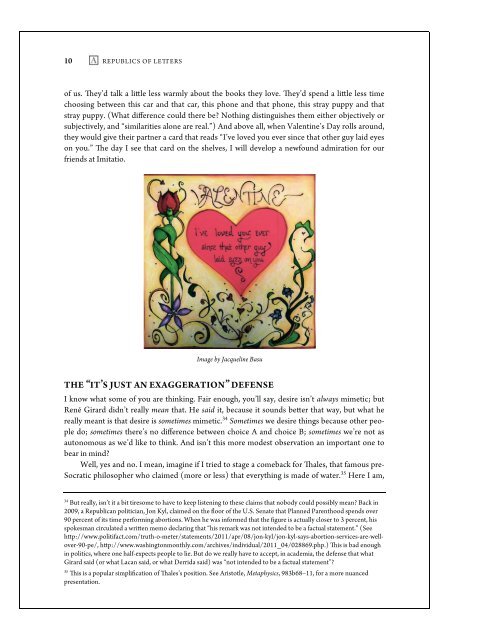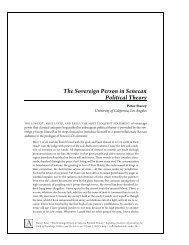Deceit, Desire, and the Literature Professor: Why Girardians Exist
Deceit, Desire, and the Literature Professor: Why Girardians Exist
Deceit, Desire, and the Literature Professor: Why Girardians Exist
You also want an ePaper? Increase the reach of your titles
YUMPU automatically turns print PDFs into web optimized ePapers that Google loves.
10 REPUBLICS OF LETTERS<br />
of us. They’d talk a little less warmly about <strong>the</strong> books <strong>the</strong>y love. They’d spend a little less time<br />
choosing between this car <strong>and</strong> that car, this phone <strong>and</strong> that phone, this stray puppy <strong>and</strong> that<br />
stray puppy. (What difference could <strong>the</strong>re be? Nothing distinguishes <strong>the</strong>m ei<strong>the</strong>r objectively or<br />
subjectively, <strong>and</strong> “similarities alone are real.”) And above all, when Valentine’s Day rolls around,<br />
<strong>the</strong>y would give <strong>the</strong>ir partner a card that reads “I’ve loved you ever since that o<strong>the</strong>r guy laid eyes<br />
on you.” The day I see that card on <strong>the</strong> shelves, I will develop a newfound admiration for our<br />
friends at Imitatio.<br />
Image by Jacqueline Basu<br />
THE “IT’S JUST AN EXAGGERATION” DEFENSE<br />
I know what some of you are thinking. Fair enough, you’ll say, desire isn’t always mimetic; but<br />
René Girard didn’t really mean that. He said it, because it sounds better that way, but what he<br />
really meant is that desire is sometimes mimetic. 34 Sometimes we desire things because o<strong>the</strong>r people<br />
do; sometimes <strong>the</strong>re’s no difference between choice A <strong>and</strong> choice B; sometimes we’re not as<br />
autonomous as we’d like to think. And isn’t this more modest observation an important one to<br />
bear in mind?<br />
Well, yes <strong>and</strong> no. I mean, imagine if I tried to stage a comeback for Thales, that famous pre-<br />
Socratic philosopher who claimed (more or less) that everything is made of water. 35 Here I am,<br />
34 But really, isn’t it a bit tiresome to have to keep listening to <strong>the</strong>se claims that nobody could possibly mean? Back in<br />
2009, a Republican politician, Jon Kyl, claimed on <strong>the</strong> floor of <strong>the</strong> U.S. Senate that Planned Parenthood spends over<br />
90 percent of its time performing abortions. When he was informed that <strong>the</strong> figure is actually closer to 3 percent, his<br />
spokesman circulated a written memo declaring that “his remark was not intended to be a factual statement.” (See<br />
http://www.politifact.com/truth-o-meter/statements/2011/apr/08/jon-kyl/jon-kyl-says-abortion-services-are-wellover-90-pe/,<br />
http://www.washingtonmonthly.com/archives/individual/2011_04/028869.php.) This is bad enough<br />
in politics, where one half-expects people to lie. But do we really have to accept, in academia, <strong>the</strong> defense that what<br />
Girard said (or what Lacan said, or what Derrida said) was “not intended to be a factual statement”?<br />
35 This is a popular simplification of Thales’s position. See Aristotle, Metaphysics, 983b68–11, for a more nuanced<br />
presentation.



